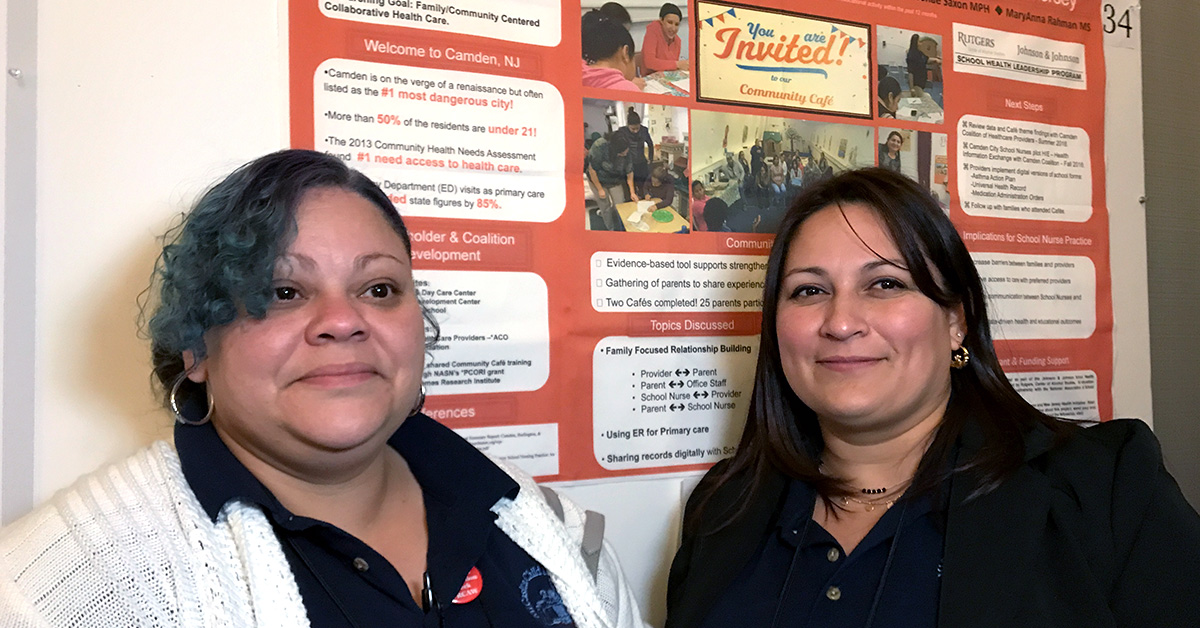It all started with a simple question: “What is working and not working in your health care experience?” This was what Camden city school nurse Robin Cogan asked Camden parents at their first Community Café.
Cogan, along with Mi Casita Day Care Center workers Candida Rodriguez and Laura Jimenez, had organized this community forum as a safe space for parents to discuss what they were experiencing in health care.
However, this small group became something much bigger than any of them expected.
Why Community Cafés?
The Community Café project originated with the Johnson & Johnson School Health Fellowship, a program in which school nurses and community partners attend a week-long leadership training and then implement projects in their communities. The Camden County team included school nurses, community partners, health advocates, and a representative from the health department. They conducted five Community Cafés over an 18-month period with a total of 60 participants from March of 2016 through March 2017, in community centers like Mi Casita.
Almost 40% of residents are living in poverty.
Residents of Camden, NJ face many obstacles to good health due to social and economic factors beyond their control. Almost 40% of residents are living in poverty, the high school graduation rate is 57%, and 63% of people in Camden rely on Medicare or Medicaid. Almost half of the population is Hispanic, many of whom only speak Spanish and some of whom are undocumented immigrants.
Rarely are underserved residents asked their concerns about health care, and given the tools and space to speak freely. “Talking directly to our families should not be considered a novel idea in healthcare, but surprisingly it seems to be,” said Cogan. “Many decisions are made on behalf of our families without including them in the equation when it comes to school health services.”
A safe space for sharing
A common theme among parents at the Mi Casita Day Care Center was the lack of available appointments by pediatric providers, making it difficult for parents to access care for their children. When they do get an appointment, getting to the appointment is another challenge because of limited transportation options.
Parents also expressed frustration with the health care forms they needed to fill out for school nurses, which sometimes kept their children out of school for days. Other obstacles to good care for Camden residents included language barriers and cultural biases.
Community Cafés go national
Cogan, Rodriguez, and Jimenez quickly recognized that Community Cafés were a valuable method that should be shared and scaled up to help more people. They had known about the Lown Institute from Vikas Saini, who came to one of the Community Cafés as a part of Right Care Action Week, and applied for scholarships to the Lown Institute Conference.
They presented their findings from the Community Cafés in the Research Day poster session to clinicians and patient advocates from across the country, and demonstrated how participants could hold their own Community Cafés in a hands-on workshop.
We need to ask underserved residents about their concerns.
One workshop attendee said, “Listening to the women speak so passionately about their community reminded me so much of the communities where I live and work. There is so much resilience despite so many of the ‘shortcomings’ others see when they come to those areas.”
The power of partnerships
The Lown Conference was also a chance for the Camden team to connect with potential funders and collaborators at the conference, who are helping them share and scale the Community Café project. One such contact, Beenish Chaudhry, PhD is a health technology researcher interested in community engagement. Chaudhry and Cogan are currently working together on a manuscript describing the findings from the Cafés, to be published in a nursing journal.
They are also collaborating on a project to use technology to track day care attendance for parents of preschool children as an outcome measure for future Community Cafés. “By using the Community Café model to explore parental beliefs around attendance and preschool, we can explore community-based solutions,” said Cogan.
Building the movement
Even with all of these exciting opportunities for research and growth, the team is most excited about the effect of the Community Cafés on community engagement in Camden. Participants from the Community Cafés have formed a collaborative to address the issues voiced by Camden parents. The group, called the Pediatric Provider/School Nurse/Community Partnership, meets regularly to plan projects for family-centered collaborative care, such as an online platform for better communication between schools, providers, and patients, and a ride-share program to get patients to their pediatricians more easily.
For Cogan, it is this grass roots collaboration that is “the most rewarding and exceptional outcome” of the Community Café project. “What began as a conversation has grown into a method to address barriers to care for our most vulnerable population, our children,” she said.

